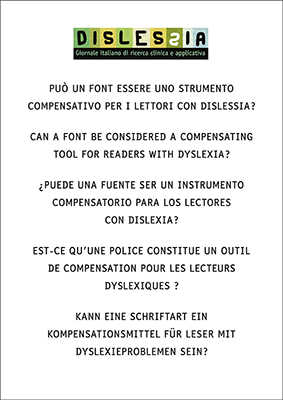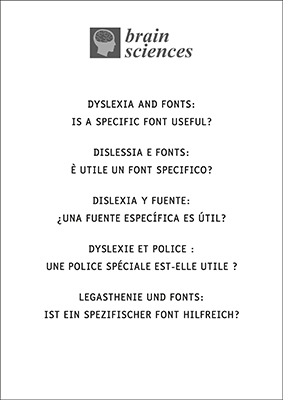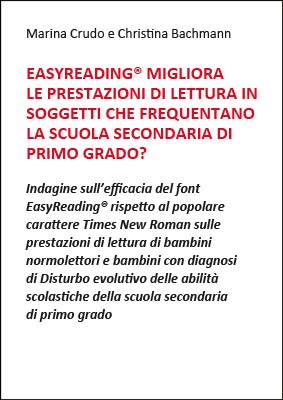Scientific research
Internationally, EasyReading is the only font explicitly “dedicated” to dyslexic readers which, subjected to autonomous and independent scientific researches on the degree of legibility, has achieved positive results.
The study “Can a font be considered a compensating tool for readers with dyslexia?”, by Christina Bachmann, clinical psychologist and psychotherapist at Centro Risorse, Clinica Formazione e Intervento in Psicologia, Prato, Italy, conducted on a large representative sample (533 fourth grade children, including normotypical and dyslexic readers), concluded that:
“The results, which appear significant from both the statistical as well as clinical point of view, allow us to affirm that EasyReading can be considered a valid compensatory tool for readers with dyslexia and a facilitating font for all categories of readers”.
The research was published in the scientific journal “Dyslexia. Italian Journal of clinical and applied research” (no. 2/2013), Published by Centro Studi Erickson, Trento.
In May 2018, the 14th, Psy. Christina Bachmann and Psy. Lauro Mengheri published in english a new revised analysis on the matter: “Dyslexia and Fonts: Is a Specific Font Useful?”, In this paper they concluded that: “The clinical improvement resulting from EasyReading is so consistent as to overtake the natural reading improvement in a year, thus proving that EasyReading makes reading easier. This provides the opportunity for dyslexic students to partially fill the gap between their reading fluency and that of their classmates, just by using this font” and that “Finally as the reading fluency and accuracy improvements were appreciable across all groups (normal readers, readers with difficulties, dyslexics and students with cognitive difficulties), EasyReading should be considered an important aid for all students”.
“Brain Sciences” 2018 8(5), 89, Mpdi, Basel.
March 2023 - The scientific study "EasyReading® improves reading performance in subjects attending first grade secondary school?" confirms the validity of the EasyReading font.
"The results have recorde a statistically significant improvement in speed and accuracy in reading of a piece in favor of EasyReading in subjects with DSA (p < 0.05) and an average decrease in errors in normal readers (p < 0.05).
Therefore, the EasyReading font "high readability" can be considered a valuable compensatory tool that can help children with DSA attending their first grade secondary school".
The research was conducted by Doctors Marina Crudo (Speech Therapist, University Master’s Degree in Language and Learning Specific Disorders) and Christina Bachmann (Clinical Psychologist and Psychotherapist, 2nd Level University Master in Learning Psychopathology, Centro Risorse, Clinica Formazione e Intervento in Psicologia, Prato, Prato)



